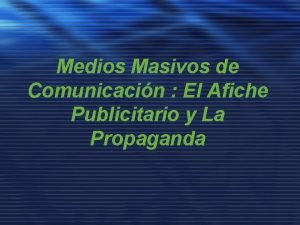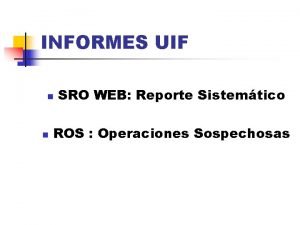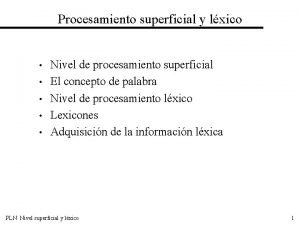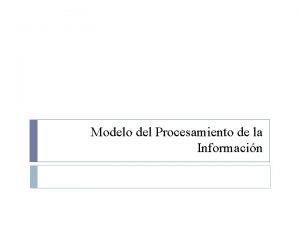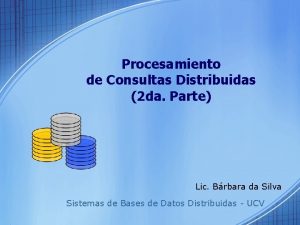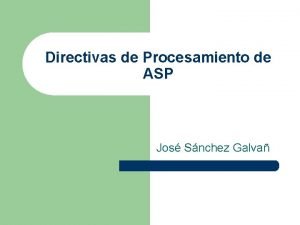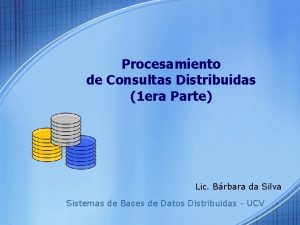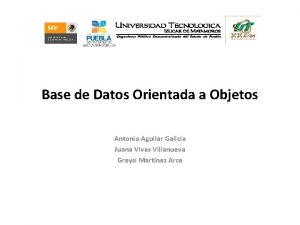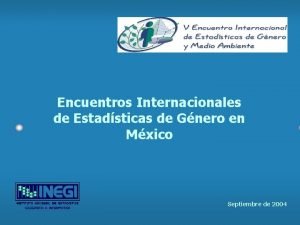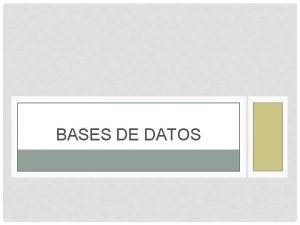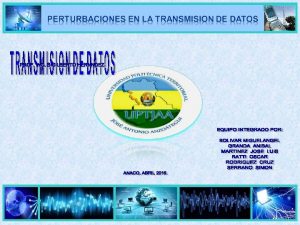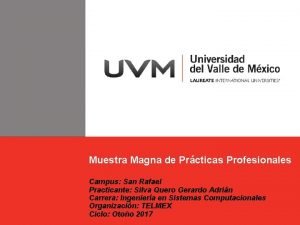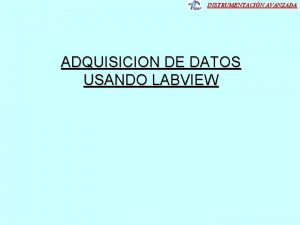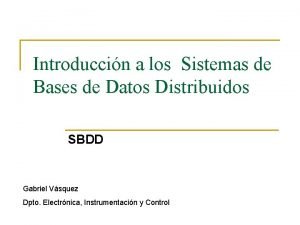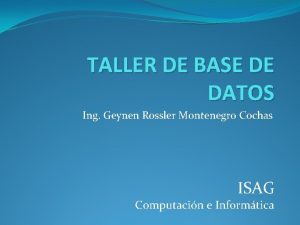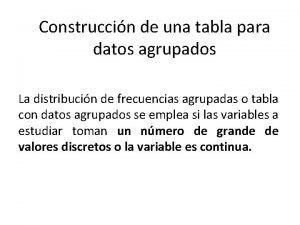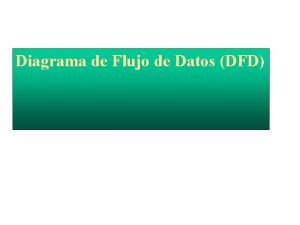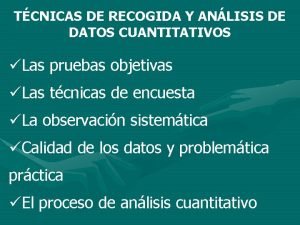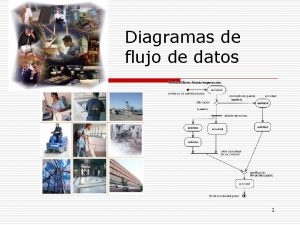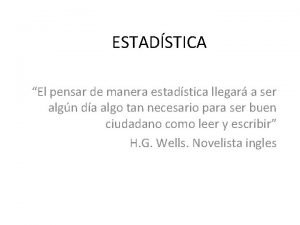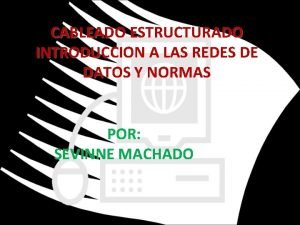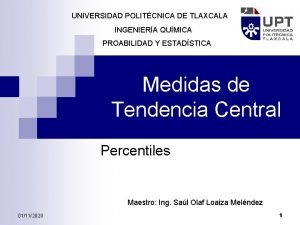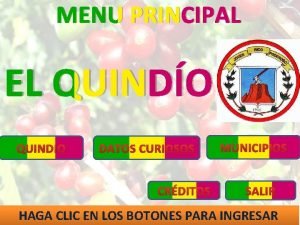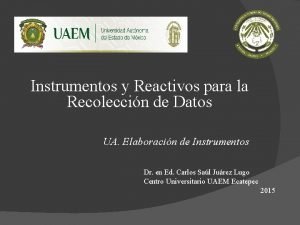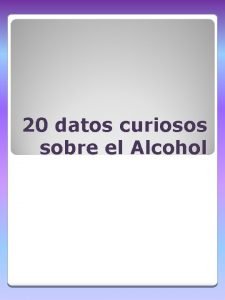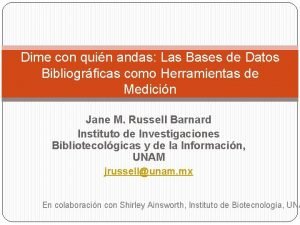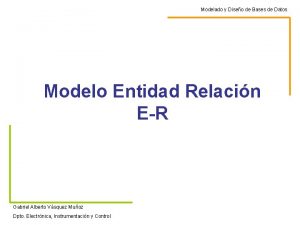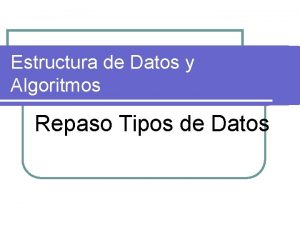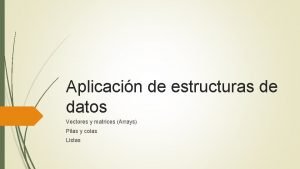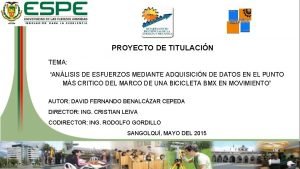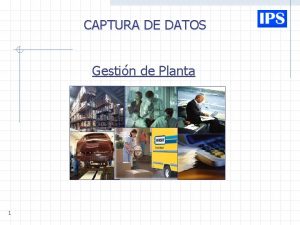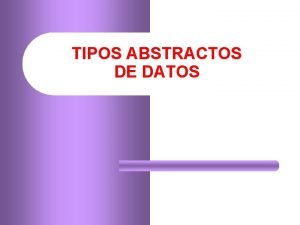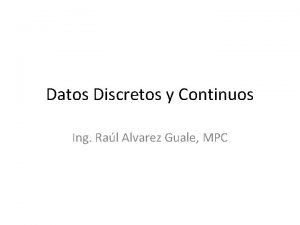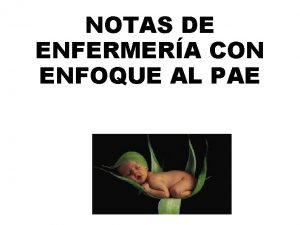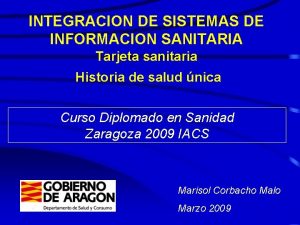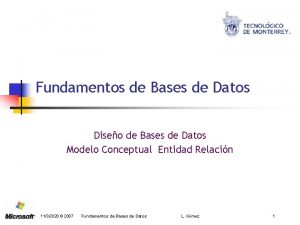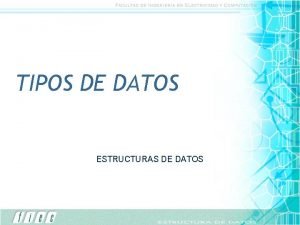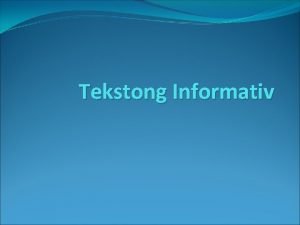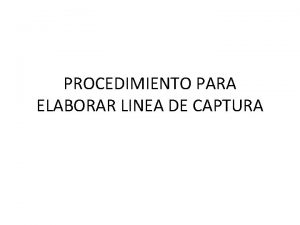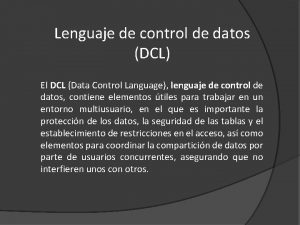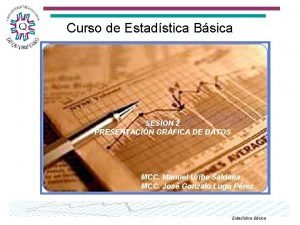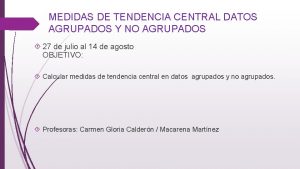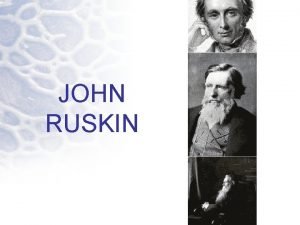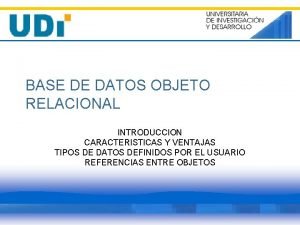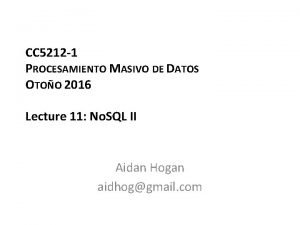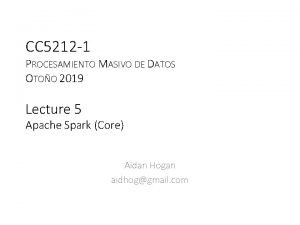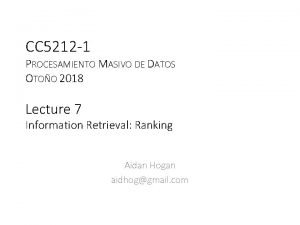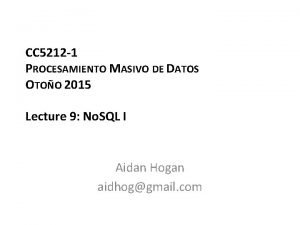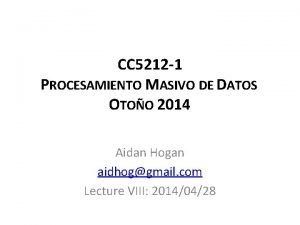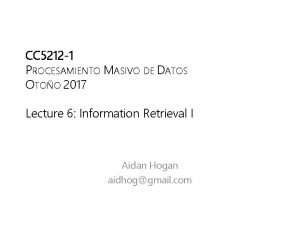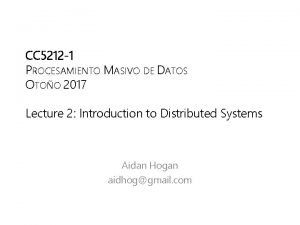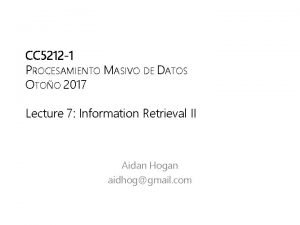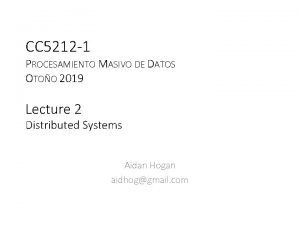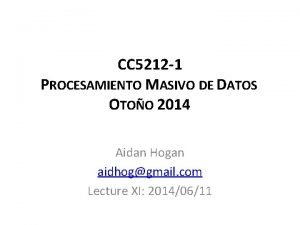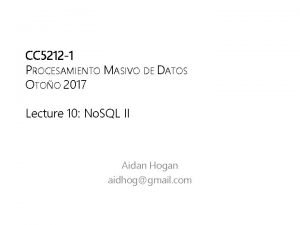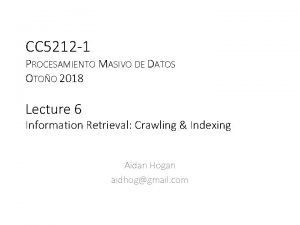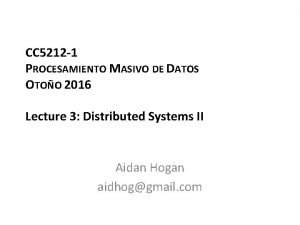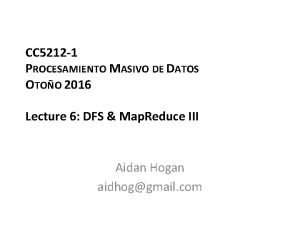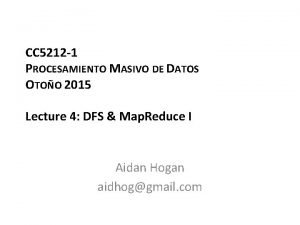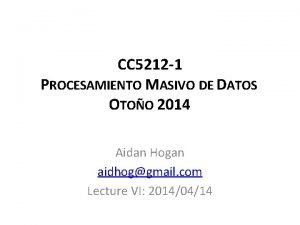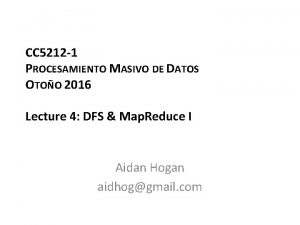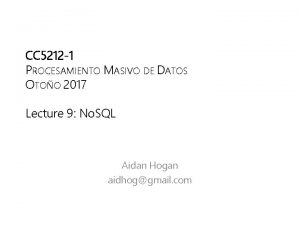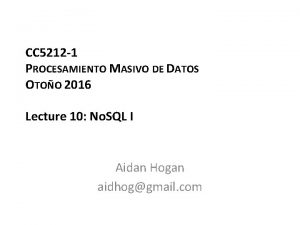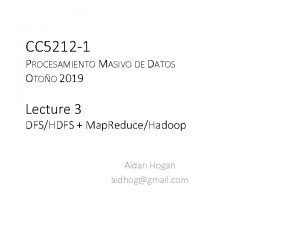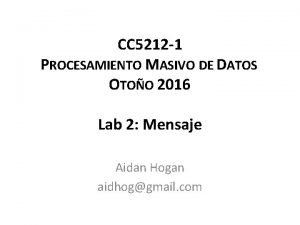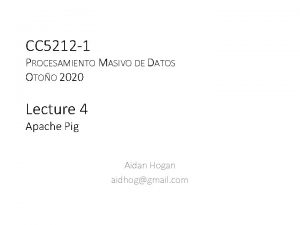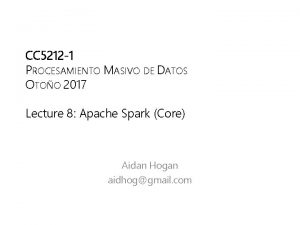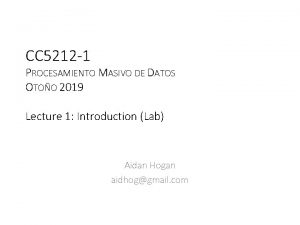CC 5212 1 PROCESAMIENTO MASIVO DE DATOS OTOO





































































- Slides: 69

CC 5212 -1 PROCESAMIENTO MASIVO DE DATOS OTOÑO 2015 Lecture 8: Information Retrieval II Aidan Hogan aidhog@gmail. com

How does Google crawl the Web?

Inverted Indexing 1 1 10 18 21 23 28 37 43 47 55 59 68 71 76 Fruitvale Station is a 2013 American drama film written and directed by Ryan Coogler. Inverted index: Term List Posting Lists a (1, [21, 96, 103, …]), (2, […]), … american (1, [28, 123]), (5, […]), … and (1, [57, 139, …]), (2, […]), … by (1, [70, 157, …]), (2, […]), … directed (1, [61, 212, …]), (4, […]), … drama (1, [38, 87, …]), (16, […]), … … …

INFORMATION RETRIEVAL: RANKING

How Does Google Get Such Good Results?

Two Sides to Ranking: Relevance ≠

Two Sides to Ranking: Importance >

RANKING: RELEVANCE

Example Query

Matches in a Document freedom • 7 occurrences

Matches in a Document freedom • 7 occurrences movie • 16 occurrences

Matches in a Document freedom • 7 occurrences movie • 16 occurrences wallace • 88 occurrences

Usefulness of Words movie • occurs very frequently freedom • occurs frequently wallace • occurs occassionally

Estimating Relevance • Rare words more important than common words – wallace (49 M) more important than freedom (198 M) more important than movie (835 M) • Words occurring more frequently in a document indicate higher relevance – wallace (88) more matches than movie (16) more matches than freedom (7)

Relevance Measure: TF–IDF • TF: Term Frequency – Measures occurrences of a term in a document – … various options • Raw count of occurrences • Logarithmically scaled • Normalised by document length • A combination / something else

Relevance Measure: TF–IDF • IDF: Inverse Document Frequency – Measures how rare/common a term is across all documents – … • Logarithmically scaled document occurrences

Relevance Measure: TF–IDF • TF–IDF: Combine Term Frequency and Inverse Document Frequency: • Score for a query – Let query – Score for a query:

Relevance Measure: TF–IDF Term Frequency Inverse Document Frequency

Relevance Measure: TF–IDF Term Frequency Inverse Document Frequency

Relevance Measure: TF–IDF Term Frequency Inverse Document Frequency

Relevance Measure: TF–IDF Term Frequency Inverse Document Frequency

Relevance Measure: TF–IDF Term Frequency Inverse Document Frequency

Relevance Measure: TF–IDF Term Frequency Inverse Document Frequency

Relevance Measure: TF–IDF Term Frequency Inverse Document Frequency

Vector Space Model (a mention)

Vector Space Model (a mention)

Vector Space Model (a mention)

Vector Space Model (a mention) • Cosine Similarity • Note:

Two Sides to Ranking: Relevance ≠

Field-Based Boosting • Not all text is equal: titles, headers, etc.

Anchor Text • See how the Web views/tags a page

Information Retrieval & Relevance

Apache to the rescue again! Lucene: An Inverted Index Engine • Open Source Java Project • Will play with it in the labs

RANKING: IMPORTANCE

Two Sides to Ranking: Importance >

Link Analysis Which will have more links: Barack Obama’s Wikipedia Page or Mount Obama’s Wikipedia Page?

Link Analysis • Consider links as votes of confidence in a page • A hyperlink is the open Web’s version of … (… even if the page is linked in a negative way. )

Link Analysis So if we just count the number of inlinks a web-page receives we know its importance, right?

Link Spamming

Link Importance Which is more “important”: a link from Barack Obama’s Wikipedia page or a link from buyv 1 agra. com?

Page. Rank

Page. Rank • Not just a count of inlinks – A link from a more important page is more important – A link from a page with fewer links is more important ∴ A page with lots of inlinks from important pages (which have few outlinks) is more important

Page. Rank is Recursive

Page. Rank Model • The Web: a directed graph Vertices (pages) 0. 265 0. 225 f Edges (links) a 0. 138 0. 127 e b d 0. 172 c 0. 074 Which is the most “important” vertex?

Page. Rank Model • The Web: a directed graph Vertices (pages) f a e b d c Edges (links)

Page. Rank Model Vertices (pages) f e b d Edges (links)

Page. Rank Model Vertices (pages) f a e b d c Edges (links)

Page. Rank: Random Surfer Model = someone surfing the web, clicking links randomly f • What is the probability of being at page x after n hops? a e b d c

Page. Rank: Random Surfer Model = someone surfing the web, clicking links randomly f • What is the probability of being at page x after n hops? • Initial state: surfer equally likely to start at any node a e b d c

Page. Rank: Random Surfer Model = someone surfing the web, clicking links randomly f a e b d What would happen with g over time? c g • What is the probability of being at page x after n hops? • Initial state: surfer equally likely to start at any node • Page. Rank applied iteratively for each hop: score indicates probability of being at that page after than many hops

Page. Rank: Random Surfer Model = someone surfing the web, clicking links randomly f a e b d c g • What is the probability of being at page x after n hops? • Initial state: surfer equally likely to start at any node • Page. Rank applied iteratively for each hop: score indicates probability of being at that page after than many hops • If the surfer reaches a page without links, the surfer randomly jumps to another page

Page. Rank: Random Surfer Model = someone surfing the web, clicking links randomly f • What is the probability of being at page x after n hops? • Initial state: surfer equally likely to start at any node • Page. Rank applied iteratively for each hop: score indicates probability of being at that page after than many hops • If the surfer reaches a page without links, the surfer randomly jumps to another page a e b d What would happen with g and i over time? c g i

Page. Rank: Random Surfer Model = someone surfing the web, clicking links randomly f • What is the probability of being at page x after n hops? • Initial state: surfer equally likely to start at any node • Page. Rank applied iteratively for each hop: score indicates probability of being at that page after than many hops • If the surfer reaches a page without links, the surfer randomly jumps to another page a e b d What would happen with g and i over time? c g i

Page. Rank: Random Surfer Model = someone surfing the web, clicking links randomly f a e b d c g • What is the probability of being at page x after n hops? • Initial state: surfer equally likely to start at any node • Page. Rank applied iteratively for each hop: score indicates probability of being at that page after than many hops • If the surfer reaches a page without links, the surfer randomly jumps to another page • The surfer will jump to a random page at any time with a i probability 1 – d … this avoids traps and ensures convergence!

Page. Rank Model: Final Version • The Web: a directed graph Vertices (pages) f a e b d c Edges (links)

Page. Rank: Benefits • More robust than a simple link count • Scalable to approximate (for sparse graphs) • Convergence guaranteed

Two Sides to Ranking: Importance >

INFORMATION RETRIEVAL: RECAP

How Does Google Get Such Good Results?

Ranking in Information Retrieval • Relevance: Is the document relevant for the query? – Term Frequency * Inverse Document Frequency – Touched on Cosine similarity • Importance: Is the document an important/prominent one? – Links analysis – Page. Rank

Ranking: Science or Art?

Information Retrieval & Relevance

CLASS PROJECTS

Course Marking • 45% for Weekly Labs (~3% a lab!) • 35% for Final Exam • 20% for Small Class Project

Class Project • Done in pairs (typically) • Goal: Use what you’ve learned to do something cool (basically) • Expected difficulty: A bit more than a lab’s worth – But without guidance (can extend lab code) • Marked on: Difficulty, appropriateness, scale, good use of techniques, presentation, coolness – Ambition is appreciated, even if you don’t succeed: feel free to bite off more than you can chew! • Process: – Pair up (default random) by Wednesday, the end of the lab – Start thinking up topics – If you need data or get stuck, I will (try to) help out • Deliverables: 5 minute presentation & 3 -page report

Datasets to play with • • Wikipedia information IMDb (including ratings, directors, etc. ) Arnet. Miner (CS research papers w/ citations) Wikidata (like Wikipedia for data!) Twitter World Bank Find others, e. g. , at http: //datahub. io/

Open Government Data Chile

Next Week (May 4 th, 6 th) • No official classes or labs next week • but … • Good opportunity to meet with your lab partner to explore project ideas! • Deadline for finding a topic: May 13 th

Questions ?
 Hemotórax masivo atls
Hemotórax masivo atls Afiche de los medios de comunicación
Afiche de los medios de comunicación Traumatismele toracice
Traumatismele toracice Sro masivo
Sro masivo Nivel superficial
Nivel superficial Modelo de procesamiento de la información
Modelo de procesamiento de la información Procesamiento de informacion por medios digitales
Procesamiento de informacion por medios digitales Procesamiento de consultas distribuidas
Procesamiento de consultas distribuidas Juegos de velocidad de procesamiento
Juegos de velocidad de procesamiento Directivas de procesamiento
Directivas de procesamiento Procesamiento en serie
Procesamiento en serie Procesamiento de consultas distribuidas
Procesamiento de consultas distribuidas Sistema endomembranoso
Sistema endomembranoso Pangunahing mapagkukunan ng datos
Pangunahing mapagkukunan ng datos Datos subjetivos
Datos subjetivos Datos de nomina
Datos de nomina Base de datos orientada a objetos
Base de datos orientada a objetos Interpretación de datos estadísticos ejemplos
Interpretación de datos estadísticos ejemplos Base de datos nombres y apellidos
Base de datos nombres y apellidos Starsoft planillas
Starsoft planillas Perturbaciones en una transmisión
Perturbaciones en una transmisión Mis datos alsea
Mis datos alsea Datos sig
Datos sig Adquisicion de datos labview
Adquisicion de datos labview Bases de datos
Bases de datos Firolux
Firolux Taller de bases de datos
Taller de bases de datos Tabla de datos agrupados
Tabla de datos agrupados Diagrama de flujo sobre el area de un triangulo
Diagrama de flujo sobre el area de un triangulo Recogida de datos cuantitativos
Recogida de datos cuantitativos Diagnostico de enfermeria de insuficiencia renal
Diagnostico de enfermeria de insuficiencia renal Diagrama hijo
Diagrama hijo Datos continuos
Datos continuos Plan abc de hidratacion
Plan abc de hidratacion Cableado estructurado
Cableado estructurado Cuartiles
Cuartiles Municipios del quindío
Municipios del quindío Datos no reactivos
Datos no reactivos Es todo aquello de lo cual interesa guardar datos
Es todo aquello de lo cual interesa guardar datos Datos curiosos sobre el alcoholismo
Datos curiosos sobre el alcoholismo Bases de datos
Bases de datos Mecanismo de accion del paracetamol
Mecanismo de accion del paracetamol Curso de modelamiento de base de datos
Curso de modelamiento de base de datos Biografia de julio verne
Biografia de julio verne Tipos de datos basicos
Tipos de datos basicos Aplicacion de estructuras de datos vectores y matrices
Aplicacion de estructuras de datos vectores y matrices Unidad de control cpu
Unidad de control cpu Ejemplos de datos abiertos en colombia
Ejemplos de datos abiertos en colombia Pamagat ng pananaliksik talakay
Pamagat ng pananaliksik talakay Datos objetivos y subjetivos
Datos objetivos y subjetivos Adquisicion de datos instrumentacion
Adquisicion de datos instrumentacion Captura de datos en planta navision
Captura de datos en planta navision Cuales son los datos personales
Cuales son los datos personales Modelo entidad relacion atributo multivaluado
Modelo entidad relacion atributo multivaluado Tipos de datos abstractos
Tipos de datos abstractos Datos discretos o continuos
Datos discretos o continuos Cambiar datos
Cambiar datos Notas de enfermería
Notas de enfermería Recogida de tarjeta de identidad de extranjero
Recogida de tarjeta de identidad de extranjero Restricciones no estructurales base de datos
Restricciones no estructurales base de datos Datos objetivos
Datos objetivos Ano-ano ang paniniwala ukol sa lalawigan ng iloilo
Ano-ano ang paniniwala ukol sa lalawigan ng iloilo Captura de datos en linea
Captura de datos en linea Lenguaje dcl
Lenguaje dcl Para el siguiente conjunto de datos
Para el siguiente conjunto de datos (auth_030).
(auth_030). Ejercicios entidad relacion resueltos
Ejercicios entidad relacion resueltos Medida de tendencia central para datos agrupados
Medida de tendencia central para datos agrupados Datos de la obra
Datos de la obra Base de datos objeto relacional
Base de datos objeto relacional

